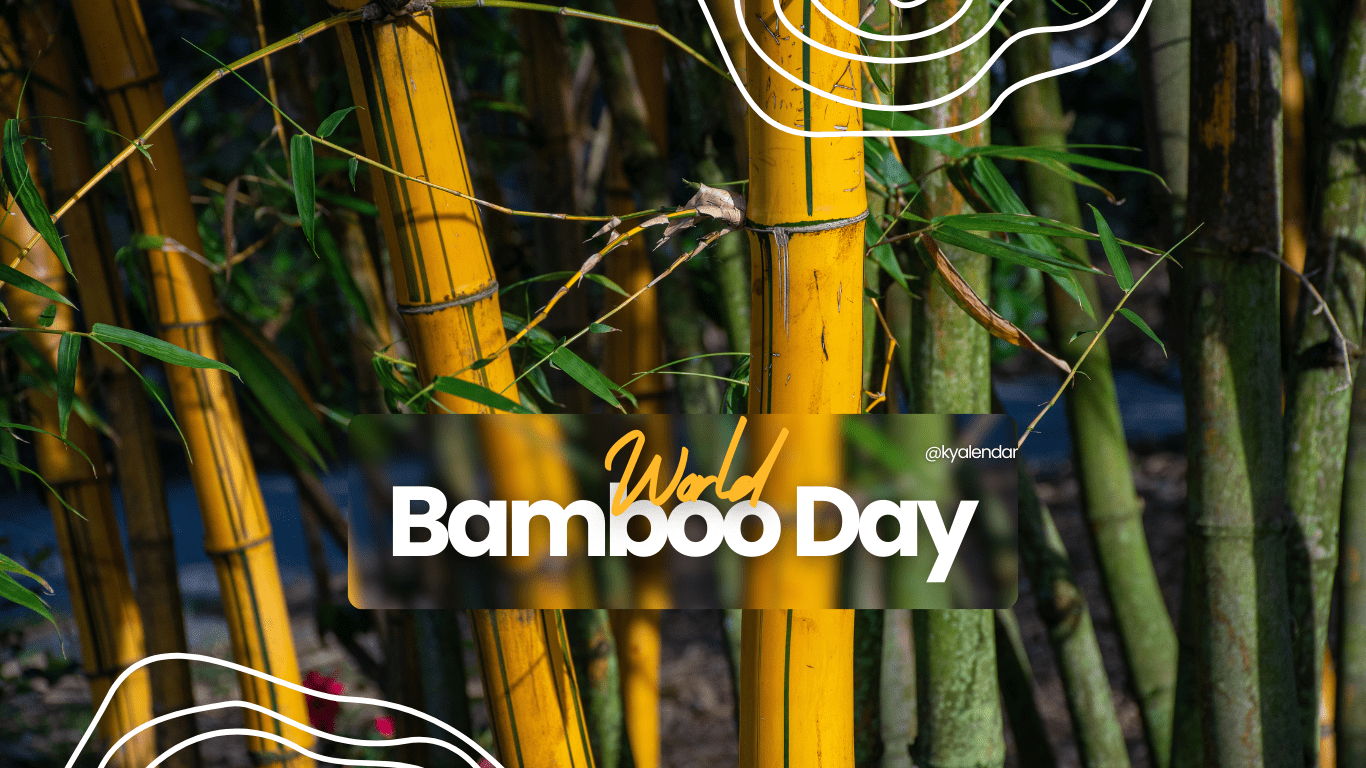
- This event has passed.
World Bamboo Day
September 18

World Bamboo Day is celebrated annually on 18th September to raise global awareness about the importance of bamboo and its role in sustainable development. This day serves as a reminder of bamboo’s versatility and its potential to contribute significantly to environmental conservation, economic development, and cultural preservation.
The Importance of Bamboo
Bamboo is often referred to as the “green gold” due to its incredible range of uses and its sustainable nature. It is a fast-growing, renewable resource that can be harvested without causing harm to the environment. Unlike trees, which can take decades to mature, bamboo can grow up to three feet in a single day under ideal conditions. This rapid growth makes it an ideal resource for addressing deforestation and reducing carbon footprints.
Environmental Benefits
Bamboo plays a vital role in environmental conservation. Its extensive root system helps prevent soil erosion and improves soil health by binding the soil together, particularly in areas prone to landslides and flooding. Moreover, bamboo forests act as carbon sinks, absorbing large amounts of carbon dioxide from the atmosphere, which helps combat climate change.
Bamboo also contributes to biodiversity by providing a habitat for a wide variety of species, including the iconic giant panda. In many parts of the world, bamboo forests are home to diverse ecosystems that are crucial for maintaining ecological balance.
Economic Significance
Bamboo’s economic potential is vast and varied. It is used in construction, furniture-making, handicrafts, paper production, and even as a source of food. In many developing countries, bamboo provides a sustainable livelihood for millions of people. Artisans and small-scale industries rely on bamboo for crafting products ranging from furniture to musical instruments.
The global market for bamboo products is growing, with increased demand for eco-friendly materials. Bamboo is being increasingly recognised as a sustainable alternative to traditional materials like wood, plastic, and steel. Its strength, flexibility, and durability make it suitable for a wide range of applications, including building materials, textiles, and biofuels.
Cultural Significance
Bamboo holds deep cultural significance in many societies around the world. In Asia, it is considered a symbol of strength, flexibility, and resilience. Bamboo has been used for centuries in traditional medicine, art, and construction. In China, bamboo is one of the “Four Gentlemen” of Chinese painting, symbolising the virtues of integrity and modesty.
In many cultures, bamboo is also associated with festivals, rituals, and celebrations. It is used in the construction of musical instruments, religious artefacts, and even as a food source in the form of bamboo shoots, which are considered a delicacy in many Asian cuisines.
Challenges and Conservation Efforts
Despite its many benefits, bamboo faces several challenges, including overharvesting, habitat loss, and lack of sustainable management practices. In some regions, bamboo forests are being depleted at an alarming rate due to illegal logging and land conversion for agriculture and development. This threatens not only the environment but also the livelihoods of those who depend on bamboo.
To address these challenges, various conservation efforts are being undertaken around the world. Organisations like the World Bamboo Organisation are working to promote sustainable bamboo cultivation and management practices. These efforts include educating communities about the benefits of bamboo, supporting research and development, and advocating for policies that protect bamboo forests.
Celebrating World Bamboo Day
World Bamboo Day is an opportunity to celebrate this remarkable plant and its contributions to the world. Events and activities are held globally to raise awareness about bamboo’s environmental, economic, and cultural importance. These events often include bamboo planting drives, exhibitions showcasing bamboo products, workshops on sustainable bamboo cultivation, and educational programmes aimed at promoting bamboo conservation.
In addition to these activities, World Bamboo Day encourages individuals and communities to explore the potential of bamboo in their daily lives. Whether it’s choosing bamboo products over less sustainable alternatives or supporting local artisans who work with bamboo, everyone can play a part in promoting this eco-friendly resource.
The Future of Bamboo
The future of bamboo is promising, with increasing recognition of its potential to contribute to sustainable development. As the world grapples with the challenges of climate change, deforestation, and resource depletion, bamboo offers a viable solution for a greener future.
Research and innovation in bamboo technology are opening up new possibilities for its use in various industries. From bamboo-based textiles and biodegradable packaging to bamboo charcoal and bioenergy, the applications of bamboo are expanding, making it a key player in the global shift towards sustainability.
Moreover, as governments and organisations continue to prioritise environmental conservation, the role of bamboo in achieving the United Nations’ Sustainable Development Goals (SDGs) is becoming more apparent. Bamboo’s potential to provide sustainable livelihoods, promote economic growth, and protect the environment aligns with several of the SDGs, making it a crucial resource for a sustainable future.
Conclusion
World Bamboo Day is more than just a celebration of a plant; it is a recognition of bamboo’s significance in building a sustainable future. By raising awareness and promoting sustainable practices, World Bamboo Day aims to ensure that bamboo continues to thrive as a resource that benefits both people and the planet. As we celebrate this day, let us reflect on the importance of bamboo and how we can contribute to its preservation and sustainable use for generations to come.
4o
Details
- Date:
- September 18